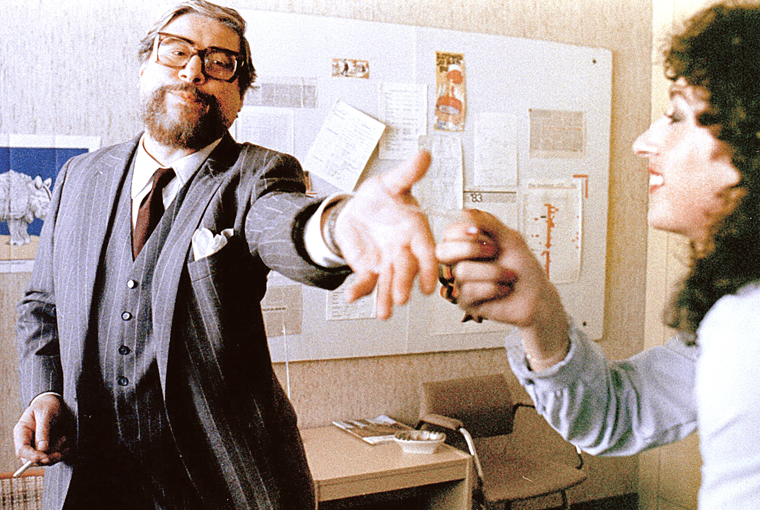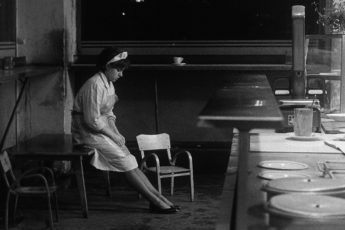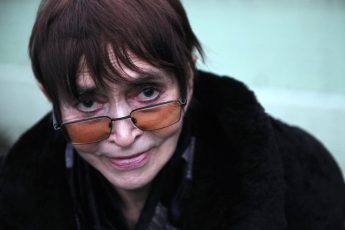A Courageous Voice from Central Europe
The Films of Věra Chytilová
Vol. 88 (October 2018) by Jan Čulík
Věra Chytilová (1929-2014) was the first woman to study film directing at FAMU, the Film Academy in Prague, and went on to become an important member of the 1960s Czech New Wave. As a female film director, she introduced new approaches into Czechoslovak cinema, quite unusually for the times, giving voice to the views and experiences of women.
The 1960s in Czechoslovakia were an era of gradual liberalization, which eventually culminated in the media orgy of freedom during the 1968 Prague Spring, which was then stopped by the Warsaw Pact invasion in August 1968. While there were still some residual, weakening aspects of Stalinist practice, Chytilová’s fellow students at the Film Academy in Prague testify that the atmosphere at the Film Academy was starting to be very liberal in the late 1950s and early 1960s. (See Paweł Pawlikowski’s BBC-produced film, Kids from FAMU, from 1990.)
Chytilová began studying at the Prague Film Academy in 1957. Students were able to view modern classical films from Western Europe and use them as their inspiration. The Czech New Wave filmmakers including Chytilová were undoubtedly informed by the French cinema vérité approach, but their work was primarily influenced by their own personal experiences of living under the regime of post-Stalinism, in the stagnant era of 1950s Czechoslovakia following Stalin’s death. As a result of these experiences, the Czech New Wave filmmakers aimed to show that the prevailing official ideological discourse was mendacious. They did this by giving emphasis to authenticity. They paid attention to ordinary, unpretentious, casual aspects of everyday life. They also practiced formal experimentation.
Věra Chytilová made films in three different eras: in the liberal 1960s, in the post-invasion “normalization” regime of the 1970s and 1980s and in post-communism after 1989. Undoubtedly, the liberal 1960s were the most fruitful period for her. During this period, she made several highly innovative and experimental films which are primarily in the center of attention of international scholars. It was much more difficult for Chytilová to communicate her message through her films in the two later periods.
Chytilová’s film Daisies (Sedmikrásky, 1966) is the most frequently praised and analyzed part of her work. The film is an experimental portrait of two young women, Marie I and Marie II, who decide that “the world is spoiled”, and so they will also be spoiled and destructive. But they behave like puppets and their acts of destruction are fairly innocent and infantile, mostly concentrating on destroying food. There are a few sequences in the film which mock lewd behavior of older men towards young women. Many Western commentators have seen Daisies and other work by Věra Chytilová from the 1960s as feminist, but Chytilová rejected that characterization. Nevertheless, it has to be emphasized that the female gaze is omnipresent in her work from the 1960s: perhaps unlike anyone else, Chytilová allowed women to speak and to express their view of the world and its male domination. This does not mean, as she would point out, that she has not been fiercely critical of the behavior of many of the women her films portray.
Daisies and especially Chytilová’s highly experimental film Fruit of Paradise (Ovoce stromů rajských jíme, 1969) were the result of the director’s collaboration with two innovative collaborators, her husband, cinematographer Jaroslav Kučera, whose background was in fine art and whose contribution to the visual creativity of Chytilová’s films was absolute, and script-writer and designer Ester Krumbachová, whose creativity and intelligence provided a theoretical background to Chytilová’s feature films from this period. Fruit of Paradise is a parody of a thriller, but it is pregnant with highly metaphorical meaning on many levels. The metaphorical meaning is communicated by means of visual experimentation which provides sophisticated links between the film’s motifs and themes.
In the 1960s, as in the other two productive periods, Chytilová also made a number of significant documentaries, or “pseudo-documentaries”. She was praised for having created the genre of “sociological film” in Czechoslovakia, i.e. documentary filmmaking with a strong interest in social issues. Chytilová’s films such as Ceiling (Strop, 1961), depicting an ordinary day in the life of a young girl ogled by men, A bagful of fleas (Pytel blech, 1962), featuring the behavior and the views of a group of female apprentices – textile workers – living in a dormitory, and Something Different (O něčem jiném, 1963), which contrasted the futility of the life of a housewife with the futility of the life of a top gymnast, are all “pseudo-documentaries” – they were carefully scripted and acted out after Chytilová’s meticulous sociological research on their subject matters.
The period after the Warsaw Pact invasion in August 1968, which ended the liberal era of the 1960s, was a catastrophe for Chytilová. Just as many other liberal filmmakers of the 1960s, she was banned from filmmaking for seven years, only being able to occasionally make television commercials under her married name Kučerová – as a film director, she had been turned into a non-person. She also lost her two most stimulating collaborators: she divorced her husband and cinematographer Jaroslav Kučera, while Ester Krumbachová, her intellectual source of inspiration, was “banned forever” by the regime. It was not until 1976 that Chytilová was allowed to make another feature film – The Apple Game (Hra o jablko) – though its premiere was threatened: Chytilová was told that the film would not be released if she did not participate in a gathering condemning the human rights manifesto Charter 77 and its signatories.
It was much more complicated to make films in the post-invasion period of the 1970s and 1980s than it used to be in the liberal 1960s. The Communist Party of Czechoslovakia was fully aware in the 1970s that it was free intellectual debate which almost caused Czechoslovakia to leave the Eastern European Bloc in the 1960s, and so it made sure that space for creativity and independent thought was extremely limited in the 1970s and 1980s. The Czechoslovaks were supposed to conform, not to think, and for this they were rewarded with mild consumerism. Experimentation with style and ideas was now practically impossible. Under the circumstances, it was a bit of a miracle that Chytilová managed to keep a degree of independence even in her films made in the late 1970s and in the 1980s.
That said, regrettably, Chytilová was never again able to return to her visual and stylistic experimentation of the 1960s. Her films from the 1970s and 1980s occasionally include short inter-textual sequences which briefly remind viewers of her earlier style, but on the whole, she now needed to concentrate on her message, which was communicated in a much more conventional visual style.
Nevertheless, Chytilová did retain her active civic attitude, never giving up her fight for public morals. Elements of feminism are present in The Apple Game decades before the #MeToo movement. The Apple Game is a critical portrait of a philandering gynecologist who becomes a symbol of the overwhelming individualistic consumerism of the 1970s and 1980s. Chytilová draws a highly critical portrait of a selfish, self-obsessed and sexually promiscuous man who assumes no responsibility for the impact of his actions. The allegedly “socialist” society is portrayed in this film as remarkably class ridden and conservative.
In Panelstory (1979) Chytilová reverted, up to a point, to her earlier technique of creating “pseudo-documentaries” by producing a study of life on a partially-built Prague high-rise housing estate. In a series of episodic, mosaic-like scenes, Chytilová convincingly captures the atmosphere and ethos of the post-invasion 1970s and 1980s in Czechoslovakia. People are aggressive, women are hysterical, and men are brutal. Chytilová notes that people have lost their capacity for compassion. Paradoxically, this type of behavior further developed after the fall of communism in the fundamentalist strand of capitalism after 1989.
In Emergency (Kalamita, 1981) Chytilová continues criticizing greed, selfishness and cynicism of Czechoslovak society of the 1970s and 1980s. The film is a story of a young man who leaves university without graduating because he feels he wants to achieve something meaningful in “real life”. He becomes a train engine driver on a branch line in the mountains, but he cannot really achieve anything due to the extreme levels of self-obsession and selfishness of all the people around him. His final train drive ends in a calamity when the train is buried in an avalanche. This is a metaphorical warning by Chytilová who argues that when people in a society are obsessed with their own individual needs, they lose their ability to act together to mitigate the impact of shared problems – the result is a catastrophe.
One of Chytilová’s major themes is the relentless passage of time. Since our lives are trickling irrevocably through our fingers, Chytilová asks anxiously whether we have used our time wisely and efficiently for the good of our community. She strongly warns against futility. This issue returns in her feature film The Very Late Afternoon of a Faun (Faunovo velmi pozdní odpoledne, 1983), an extremely scathing portrait of an aging bachelor who is foolishly trying to fight against the advance of old age by manically courting young girls. The film again warns against senseless consumerism and selfishness. Similar themes can be found in A Hoof Here, a Hoof There aka Tainted Horseplay (Kopytem sem, kopytem tam, 1987), a film that records a very strong sense of decomposition in the stagnant post-invasion regime of Czechoslovakia a mere two years before its final collapse. The most characteristic features of this film are again meaninglessness, consumerism and hedonism. The film features a group of young people who systematically indulge in sex with one another because there is nothing else to do in a society which has lost its purpose. Inevitably, they end up being infected with HIV/AIDS.
While in the liberal 1960s Chytilová, like the other film directors of the Czech New Wave, concentrated on the authenticity of life and on giving women a voice, thus subverting the official ideological narrative, her approach after the 1968 Warsaw Pact invasion and after the fall of communism in 1989 was much more anti-consumerist. In pursuing this approach, Chytilová realized that in the atmosphere of individualism, encouraged by the post-invasion and the post-communist regimes, the main problem of Czech society was self-indulgence, self-centeredness and selfishness. When the regime after the Soviet invasion in 1968 told its citizens that they did not need to believe in anything – that they just had to obey and follow the party line, no matter how it might change, for which they would be rewarded with cars, color TV sets and second homes -, this indeed led to an explosion of individualism, which then deepened after 1989. (Most Czechs had second homes in the countryside in the 1970s and 1980s.)
An interesting question arises as to what extent Chytilová’s anti-consumerist criticism also addressed Western societies. While Czechoslovak filmmakers of the second half of the twentieth century did have some idea about social and cultural developments in the West, they primarily reacted to the political and social reality of their own societies. In this day and age, in the era of the internet and global social networks, it is perhaps difficult to realize how isolated the Eastern European societies were from the outside world, and not just linguistically. In the first half of the 1960s, it was almost impossible for Czechoslovak citizens to travel even to East Germany, and in the 1970s and 1980s it was extremely difficult for Czechoslovaks to obtain permission to travel, even for short periods of time, to the West. Thus, it must be emphasized that Chytilová primarily reacted to the situation in her own country, acting as a responsible citizen, always trying to improve the status quo, or at least to start a debate. Nevertheless, it is a characteristic feature of the work of the Czech New Wave filmmakers, that while the primary inspiration for their filmmaking is local, their films do have a general meaning and thus bear relevance for international audiences.
Chytilová made documentary or pseudo-documentary films in all the three periods of her creative activity, especially after 1989, when she was no longer a suspicious and proscribed filmmaker and was free to make documentaries primarily for Czechoslovak (and then Czech) public service television. As has been mentioned above, many of her feature films also display documentary features.
Chytilová’s documentary Prague, the Restless Heart of Europe (Praha, neklidné srdce Evropy), made at the Prague Short Film Studios in 1984 for a series about European cities to be broadcast by the Italian TV broadcaster RAI, is probably a creative culmination of her work from the post-invasion period of the 1970s and 1980s. The film is again a highly stylized dramatic collage which uses images of historical buildings and fragments of Czech music and poetry to document the history of Bohemia and Czechoslovakia as it imprinted itself on the Czech capital. However, the making of the film was evidently under strict ideological control of the communist apparatchiks of the time, resulting in the fact that Chytilová could not show a single non-communist politician from the era of the inter-war Czechoslovak democratic republic, not even the founder of independent Czechoslovakia, highly revered “President Liberator” Tomáš Garrigue Masaryk. The film is dominated by Chytilová’s obsession with the need to make the lives of human beings meaningful, and with the relentless passage of time. Chytilová here skillfully handles the requirements of communist propaganda which pressurized her to show the successes of the regime. Momentous historical events from previous centuries are juxtaposed with scenes from contemporary streets of Prague which are represented by the restless, speeded-up milling of crowds, girls staring blankly into the lens of the camera or cars driving on highways. There are also images of a North-Korean like mass sporting festival, the so-called “Spartakiáda”, whereby the Czech nation has been transformed from a community of individuals into one giant ant-like crowd of automated beings. In contrast to the great historical events of the past, mindless collective vacuity and meaninglessness rule supreme in the present.
The post-communist period was, it would seem, the greatest challenge for Chytilová. Paradoxically, although she was ostracized and censored in the post-invasion era of the 1970s and 1980s, she managed to make seven feature films in the thirteen years between 1976 and 1989; in the period of freedom after the fall of communism, in the twenty-five years from 1989 until her death in 2014, she was able to make only four feature films.
State-owned Czechoslovak cinema was privatized after the fall of communism, despite protests by many famous Czech filmmakers of the 1960s, including Chytilová herself. Political oppression was gone, but commercial pressures immediately arose. What is more, Chytilová remained a highly critical commentator with regard to what was happening in the post-communist era and this did not go down particularly well, especially in the first years after the collapse of communism when everyone was expected to applaud the new “capitalist” regime.
Chytilová did not do so.
Her first film from the post-communist era, The Inheritance or Fuck Off, Boys, Guten Tag (Dědictví aneb Kurvahošigutntag, 1992) is a pre-scient analysis of boorishness enhanced by the limitless power of money and by the lawlessness of the new post-communist environment. At the time, the film attracted much criticism. The critics did not like that the film was a blatant caricature of the post-communist era, which was supposed to be brilliant. Later on, one critic admitted that in hindsight, this film was much more realistic than he was willing to admit at the time. (Little did the critics know, that a character very much resembling this film’s “hero”, post-communist oligarch billionaire Andrej Babiš, would become Prime Minister in the Czech Republic a quarter of a century after this film was made.)
On the film’s DVD edition, Boleslav Polívka, who wrote the film’s script and starred in its main role, explains that he got the idea for Inheritance when a drunk man, whom he knew vaguely, stopped him in a street in Brno and cordially invited him for a drink. The man then began to show him various houses, hotels and flats in the area and said emphatically, “Come with me, everything here is mine.” When Polívka resisted, the man started shouting at him, “I’ll find you again, maybe in Paris, and I’ll come in a taxi.” The film’s main character, Bohumil Stejskal, is a lazy country bumpkin who suddenly inherits several valuable properties thanks to the post-communist restitution laws. The film is a study of the childish, yet good-natured uncouthness of a loudmouth, an analysis of a human being who cannot come to terms with his sudden freedom and wealth, which has come upon him unexpectedly. Like several other post-communist films, this one is also a reminder that the fall of communism and the general spread of pornography and sex for money have made it possible for some men to realize their most chauvinistic ideas about using women. Chytilová’s Inheritance is dealing with the haphazard, unjust and chaotic nature of life after the fall of communism. It analyzes truly demotic processes and notes the sudden degradation in mores which was brought about by the unexpected arrival of freedom.
Chytilová’s next film, Traps (Pasti, pasti, pastičky, 1998), is even more brutally provocative. A young woman is the central character. The central theme of this film is the subjugated place of women in aggressive and corrupt post-communist society, a society dominated by men who ruthlessly go their own way and stop at nothing to get what they want. The powerful oligarch Bach and his crony, the corrupt and incompetent MP Dohnal, break the law. No one cares.
Dohnal and Bach’s right-hand man Petr rape Lenka, a vet whom they offered a lift in their fancy limousine after her car had run out of petrol. When Lenka sees that there is no hope of a trial for the men guilty of her rape, she invites them to her chalet – Dohnal is under the blissful illusion that she enjoyed the rape and that there will be more of the same – where she drugs and castrates them while they are asleep.
Lenka is considered mad in a society where nepotism, corruption, aggression and male chauvinism are prevalent. Everyone abandons her. Her boyfriend holds her guilty for the fact that she has been raped. Towards the end of the film, at a public hearing, Lenka shouts out that the two men had raped her. She is dismissed with a flea in her ear and taken away in an ambulance to a lunatic asylum. Bach and his cronies rule supreme. It is beyond the power of any woman to stand up against the values of post-communism.
The reviews of the film were scathing. Here is an example: “Chytilová has produced loud complaints about the political situation of the kind that can be heard amongst drunks in the lowliest pubs. Zombies stagger about on the screen, decimated by their disgusting sexuality and morally condemned in the same way as the communist regime used to condemn the fat cigar smoking western capitalists. This film is the product of an embittered woman. It is a lurid piece of political agitation”.1 The post-communist regime of the 1990s really did not like criticism. Yet Chytilová did retain her courageous civic attitude even in this difficult era.
Věra Chytilová’s last ever made feature film, Pleasant Moments (Hezké chvilky bez záruky, 2006) is again a scathing criticism of life in post-communist Czech Republic, this time concentrating on personal relationships. Chytilová collaborated with the psychologist Kateřina Irmanovová on the script, the film being a semi-autobiographical account of the psychologist’s experience. In the film, a psychologist passively records information about the file of her obsessive and extremely selfish patients.
By making this film, Chytilová complains that the foundations of contemporary Czech society have been destroyed, possibly irreparably. The reason is the deplorable state of human relations. People are almost obsessively selfish in their behavior: they indulge their own interests exclusively, they are incapable of empathy and their narcissism prevents them from seeing the world normally, which often makes them behave like madmen. This is the main message of this frenetic farce.
Věra Chytilová was one of the most courageous and inventive Czechoslovak film directors. In the 1960s, she was able to avail herself of the fertile environment of this highly creative era to make an important contribution to the history of world cinema, both in terms of her stylistic and thematic innovation. It was much more difficult to continue working as a filmmaker in the oppressive atmosphere of the 1970s and 1980s as well as in the new, commercial environment after the fall of communism. This meant that Chytilová had to give up most of her formal experimentation, but she never gave up her civic responsibility. A profound, critical engagement with the most salient features of the times has remained the characteristic feature of all her cinematographic output.




Leave a Comment